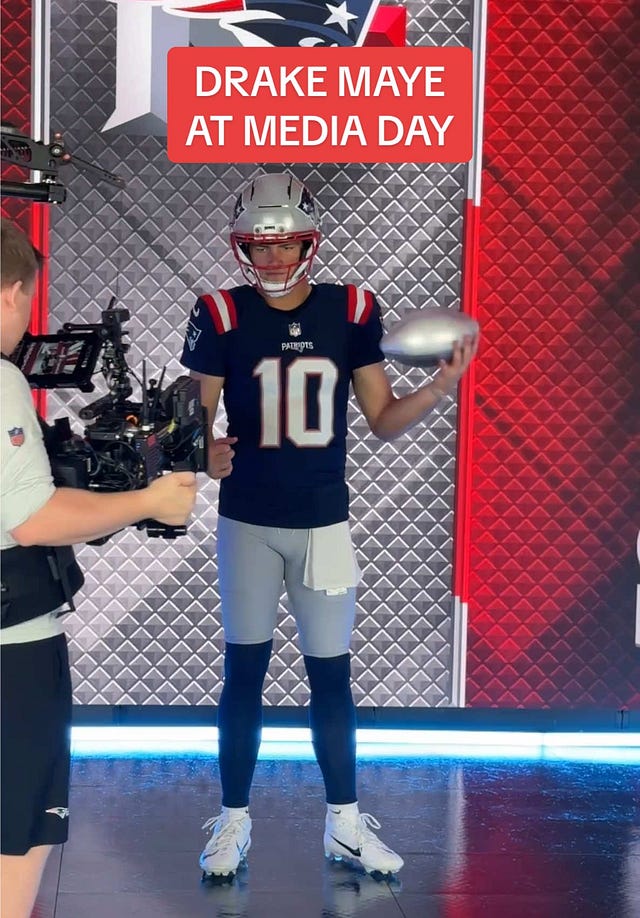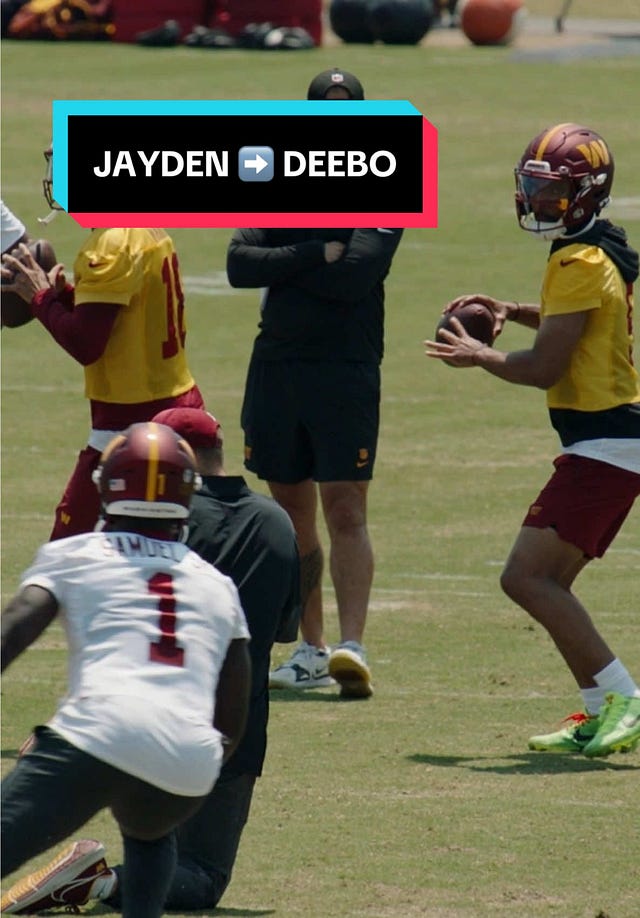🏈 The Touchdown Collective: Rodgers drama comes to an end
Aaron Rodgers, Sam Darnold, Cam Ward and Antoine Winfield Jr all feature to keep you ahead of the game, one play at a time
In today’s Touchdown Collective there’s the latest on Aaron Rodgers’ decision to join Pittsburgh in Press Coverage, my take on a European NFL division in a bumper version of Play Call, a Silver Surfer in Get to the Post – and it’s all about the weather in Snap!
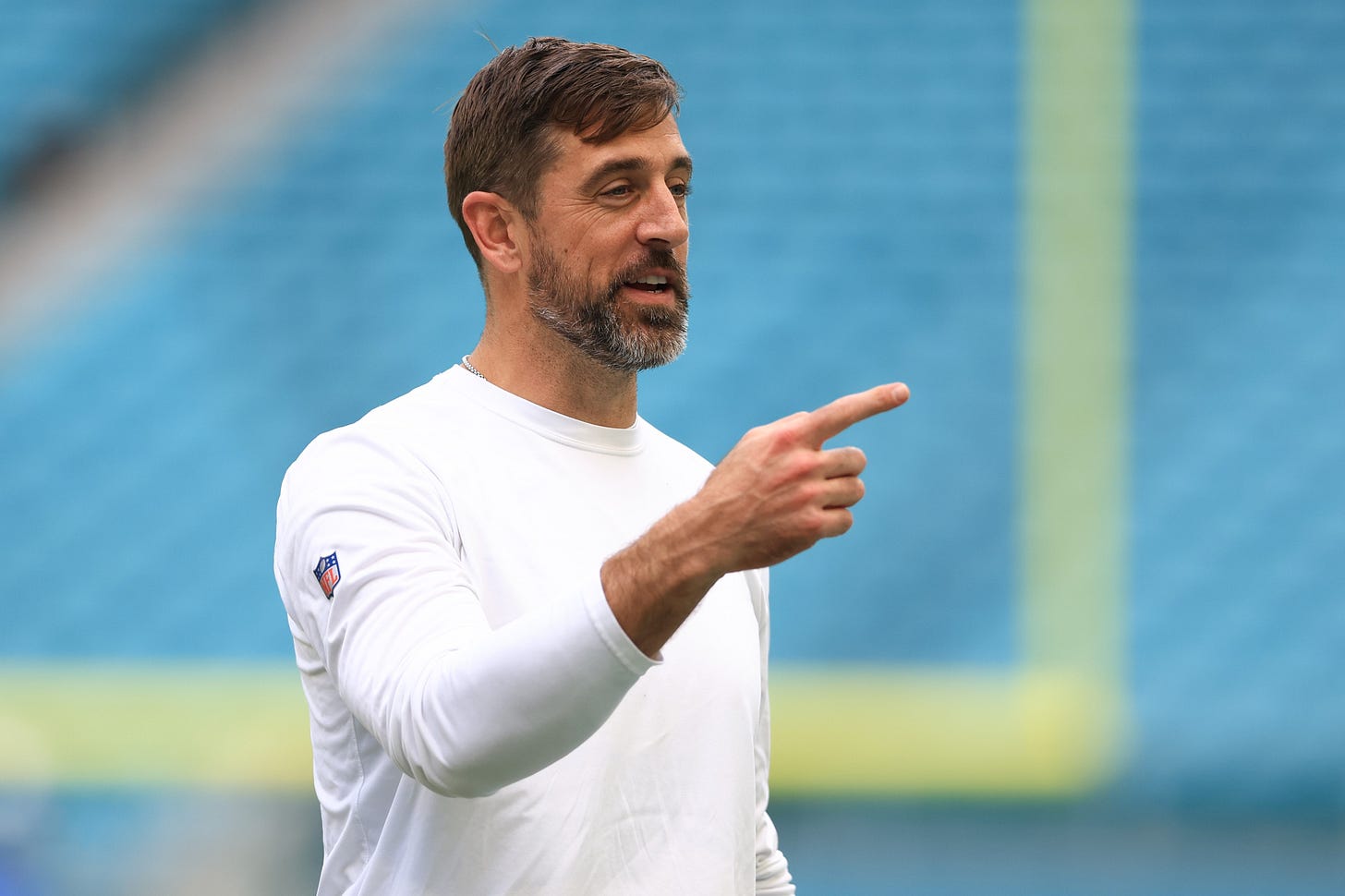
📰 Press Coverage
Pittsburgh Steelers
The longest-running saga of the offseason is finally over after Aaron Rodgers agreed to join the Steelers, pending a physical.
The future Hall of Fame quarterback and four-time MVP will sign a one-year deal with Mike Tomlin’s side today after contemplating retirement after leaving the New York Jets following last season, as first reported by NFL Insiders.
The deal means Rodgers will be able to take part in the Steelers’ minicamp next week, which starts on Tuesday and runs to Thursday, and he is expected to take part.
His decision ends the will-he, won’t-he saga which has now effectively seen him and Justin Fields switch teams this off-season.
Now all eyes will turn to the Steelers’ first game of the season and, you guessed it, they play the Jets in New York.
Tennessee Titans
No.1 overall Draft pick Cam Ward is loving life as a Titan.
The QB says not to worry about burnout as he works his way through the OTA schedule, as Jim Wyatt captured.
“I am always energised – I am playing football,” Ward said. “I am doing what I love, and not a lot of people can do that in this world. So, I am always going to have energy when I’m on the field.”
Meanwhile, Ward says he has a top-five – “if not the best” – receiver at his disposal this season, just a few weeks into working with Calvin Ridley, reports Alex Daugherty of the Nashville Tennessean.
"That man’s a dog," Ward said of Ridley. “I’m blessed to play with him, he’s going to make me look good. He can run against press man, he knows zone. I think he’s one of the top five receivers in the NFL, if not the best.”
Buffalo Bills
Tre'Davious White is back in Buffalo and giving things an extra 10 per cent.
The Bills drafted White in the first round in 2017 and he switched to the LA Rams in March 2024 after being released. He was traded mid-season to Baltimore before re-signing with Buffalo in April this year.
But how has it been getting to know his old team-mates and pick up on how things are done? Well, according to White, he just needed a 10 per cent boost.
He said: “It was easy to get back in, the verbiage is still the same, little bit of differences with the techniques we did when I was here the first time but as far as catching back on, I 90 per cent knew everything, so the extra 10 per cent is just different techniques that we do in some of the coverages. But overall coach has been doing a great job of getting me the information and I’m taking it to the field.
“It’s been easy, so no complaints about that.”
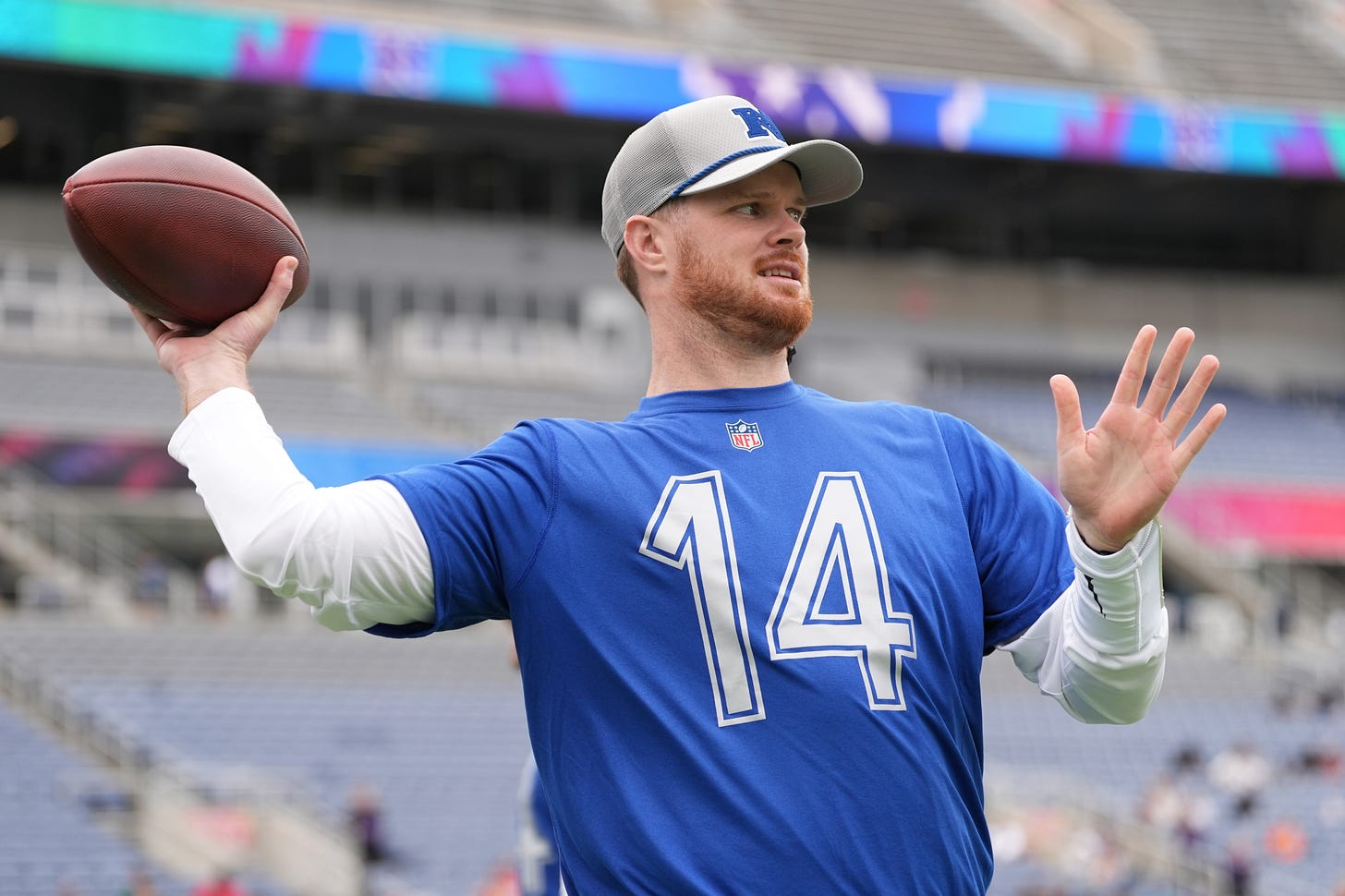
Seattle Seahawks
Sam Darnold is getting a real education in Seattle under offensive coordinator Klint Kubiak as he was named QB1 by head coach Mike Macdonald, who labelled media “crazy” for asking the question in the first place.
Having said when he signed with the Seahawks that working with Kubiak was a key part of his decision-making process, it’s no surprise that Darnold is currently loving life on the West Coast.
He said: “There’s some familiar things that obviously we did in San Francisco. But just learning a ton, learning a ton right now and just like I mentioned kind of before, just building with the guys and taking it one day at a time.”
New York Jets
Wide receiver Josh Reynolds will do whatever it takes to help the Jets win this season. Reynolds has bounced around since leaving the LA Rams in 2020, with the Jets his fifth side since his time in California came to an end.
The 2017 fourth-round Draft pick, who played at Texas A&M, is now in New York and said: “I’m here for whatever they need me for. If it’s [wide receiver] two, if it’s three, I’m here to help the team win. Time will tell. We still got to go through camp and all that. Guys will emerge and some guys will fall, that’s just the nature of the business. I’m here to help the team win.”
Tampa Bay Buccaneers
Antoine Winfield Jr is looking back to his best ahead of the 2025 season.
The former All-Pro is healthy and ready to go says head coach Todd Bowles.
He said: “He’s been great. I mean, he looks like he’s in great shape. He’s been here almost every day. He puts in the work, he puts in the time, and I like where he’s at right now.”
📸 Snap!
The fourth quarter between the Philadelphia Eagles and the Los Angeles Rams in the NFC Divisional at Lincoln Financial Field on January 19 this year fell foul of the weather.
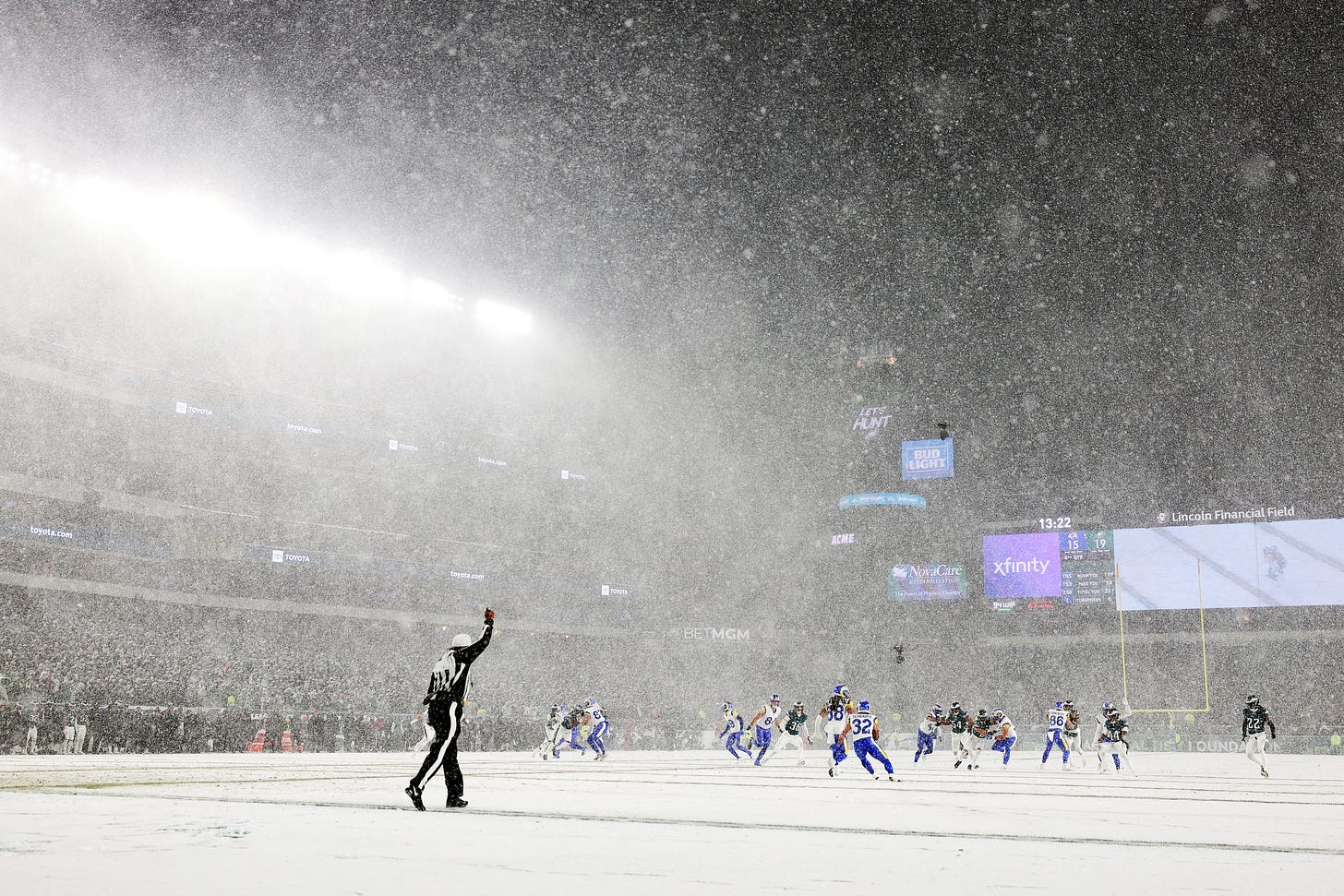
🗣️ Play Call
The Touchdown Collective’s verdict
In Monday’s edition of the Touchdown Collective I noted a piece by Mike Florio who said a source with knowledge of the situation was aware that the NFL Players Association is preparing for the NFL to eventually make a push for a four-team European division.
A European-based team has been a topic of conversation for years since the Miami Dolphins hosted the New York Giants in the first International Series game at Wembley in October 2007 – but a whole division? That is taking things to the next level.
Taking things to the next level is what the NFL is doing with the increase in international games in recent years, along with Minnesota playing back-to-back road games in 2025, firstly in Dublin v Pittsburgh, followed the week after with a clash against Cleveland in London.
But is this at all viable? Well, I thought I might as well take a run at 10 reasons why a European-based NFL division will never happen.
Buckle up…
1. The Salary Cap and competitive imbalance
The NFL salary cap is designed to ensure competitive balance by giving all teams equal financial resources to spend on players. However, introducing European teams would complicate this system significantly. Different tax laws, currency exchange rates and cost-of-living disparities across European countries would create inconsistent economics. Players on a team based in, say, London or Frankfurt might have significantly less take-home pay than players in Florida or Texas due to higher tax burdens.
To maintain fairness, the league would either have to customise cap structures for these teams – undermining the spirit of parity – or accept that European franchises would be at a financial disadvantage, impacting their ability to attract talent.
2. Time zone differences and broadcasting issues
The NFL is structured around a tightly controlled television schedule, with Sunday and Monday night games drawing millions of viewers. Adding a European division would disrupt this rhythm. A game played at 1pm in London would be played at 8am on the East Coast of the US and even earlier on the West Coast – hardly ideal for viewership and advertising revenue long term.
Conversely, evening games in the US would conclude in the middle of the night in Europe, limiting fan engagement. This time gap would also hinder team meetings, film sessions and recovery schedules if a team had to prepare for games across vastly different time zones week after week.
3. Travel logistics and player health
Transatlantic travel poses a substantial logistical nightmare. Teams would need to regularly fly between the US and Europe, crossing multiple time zones and subjecting players to repeated jet lag, which would likely impact performance and increase the risk of injury.
Even with carefully structured travel plans and bye weeks, this level of long-distance travel would place European teams at a disadvantage compared to domestic US teams. The fatigue from frequent international flights would also affect the integrity of the competition, creating uneven playing conditions across the league.
4. Playoff hosting complications
The idea of a playoff game being hosted in Europe introduces a host of complications. The stakes are highest in the postseason and no team would want to travel across the Atlantic to compete in such a crucial game. US-based teams would be disadvantaged by the travel and time adjustment, while European teams might enjoy a strong home-field advantage. And of course the same holds true the other way around also.
And that’s before the potential outrage from American fanbases, who might resist the idea of potentially critical games being played many thousands of miles away on short notice. This would dilute the domestic hype that typically surrounds the postseason, impacting attendance, atmosphere – and, perhaps most importantly of all for the NFL, TV ratings.
5. Player reluctance to join European teams
Perhaps the most foundational issue is player resistance. While a few games in London each season across the league for US teams are clearly manageable, being drafted to live and work full-time in a foreign country is a far bigger ask. Many NFL players have expressed reluctance to play overseas due to family ties, cultural barriers and lifestyle differences.
If European franchises were introduced and included in the Draft, some players might demand trades or simply refuse to report, creating instability and reducing the viability of those teams. Retaining free agents would also be challenging, making roster-building a constant uphill battle.
6. Lack of established NFL infrastructure in Europe
While interest in the NFL has grown in Europe, especially in the UK and Germany, there still isn’t a robust infrastructure to support a division-level operation. Stadiums, training facilities and medical support systems comparable to NFL standards are limited. They can’t play at Wembley or Tottenham every other week.
The absence of college football in Europe also means there’s no local feeder system, making European teams entirely reliant on talent from the US, which further compounds the recruitment and relocation problems.
7. Inequality in team schedules
Integrating four European teams into the regular season would require a complete overhaul of the NFL schedule. These teams would either have to endure a disproportionate number of US road trips, or US-based teams would have to make frequent visits across the Atlantic.
In either case, the result is a skewed schedule that hurts some teams more than others. This would draw criticism from fans, coaches, and analysts alike, who already go through schedules and look for perceived imbalances.
8. Questionable long-term fan support
Though NFL games in London often sell out, this doesn’t necessarily translate into the kind of year-round loyalty that NFL franchises rely on – and most fans in the UK already support a team and are unlikely to ditch that for an expansion team. I certainly wouldn’t.
The NFL remains a niche sport in most of Europe, and it’s uncertain whether local fans would support a losing team over multiple seasons or maintain interest without the novelty factor. Without a passionate and reliable fan base, it would be difficult for teams to thrive financially and culturally.
9. League governance and international law
Operating professional sports franchises under different legal systems introduces a host of legal hurdles. From labour laws and contract enforcement to health and safety regulations, the NFL would have to manage a raft of international compliance requirements. These complications could increase operational costs and risks, making it harder to administer a fair and uniform league.
10. Alternatives already exist
The NFL has already found a balanced compromise through its International Series –hosting games in cities like London, Munich, and Mexico City without permanently relocating teams. This allows the league to grow its global brand without causing an issue to its core structure. Given the significant downsides to a European division, the league will likely continue expanding its international footprint through short-term showcases, rather than permanent relocations.
In conclusion, while the idea of a European NFL division is frequently discussed as a sign of the league’s ambition to become a global brand and attempt to continue to bring in new fans, the structural, logistical and cultural challenges make it highly unlikely to ever happen.
In short, NFL games Europe will almost certainly remain limited to one-off games rather than permanent teams.
↗ Get to the Post
What kind of ball is that, Drake….?
 Tiktok failed to load.
Tiktok failed to load.Enable 3rd party cookies or use another browser
Jayden Daniels and Deebo Samuel connect at OTAs…
Worried? Yes, I’d say so…
📩 Who am I? I’m Michael Ham, the Daily Star Sunday and Sunday Express Sports Editor – and an avid NFL fan. I have almost 20 years of experience in sports news journalism and I’m the writer behind The Touchdown Collective. Write to me using this form with your thoughts on anything in this newsletter, things you’d like to see more of, or your view on anything NFL.
🙌 Thanks for reading The Touchdown Collective! I will continue breaking down the NFL next week. In the meantime you can share this great find with your friends and family, simply click on the link below and follow the instructions so they can join too. Thanks, it means a lot.
The Touchdown Collective: Your go-to NFL source to
stay one step ahead of the game





